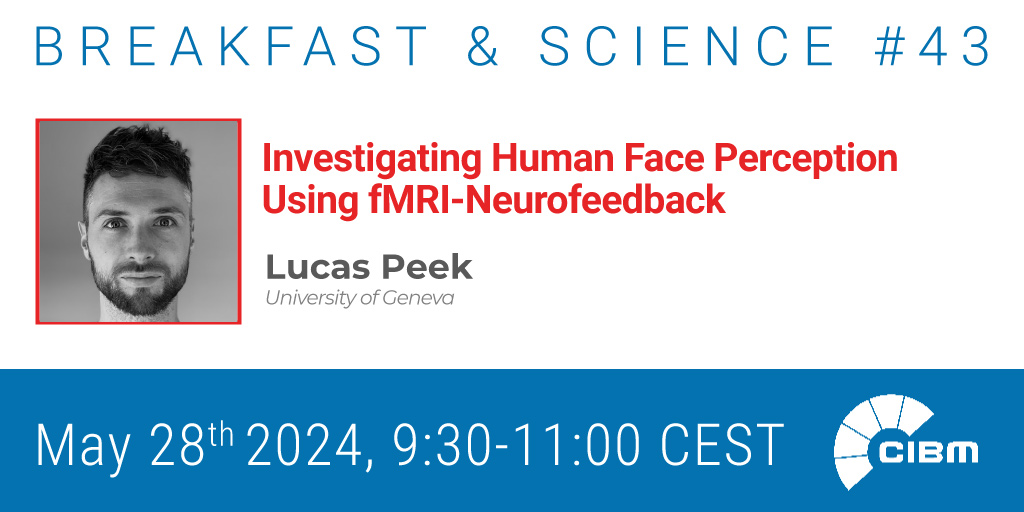
On the 28th of May 2024, the 43rd CIBM Breakfast & Science Seminar was given by Lucas Peek from the University of Geneva. The event was chaired by Damien Marie, Research Staff Scientist, CIBM MRI UNIGE Cognitive and Affective Neuroimaging Section.
Investigating Human Face Perception Using fMRI-Neurofeedback
Abstract
I will present the results of my PhD work where we investigated the neural mechanisms of face perception, utilizing real-time functional magnetic resonance imaging (rt-fMRI) neurofeedback. This novel approach enables the self-regulation of brain activity in specific regions, providing new insights into cognitive processes underlying, in this case face detection and recognition.
The first part of my talk will present findings from a study where we trained healthy participants to enhance activity within the fusiform face area (FFA) and the occipital face area (OFA), key nodes in the face processing network. Our results challenge traditional hierarchical models of face perception, suggesting instead that the FFA and OFA play distinct, non-hierarchical roles in detecting faces and recognizing their identities.
In the second study presented we trained healthy volunteers to increase subliminal activation in the FFA, contrasting this with a control group focused on the right inferior parietal sulcus (IPS). With our results we demonstrated that specific training in the FFA can enhance the perceptual processing of subliminally presented faces, leading to improved behavioral detection. These effects were specific to the FFA and were not replicated by training aimed at the IPS, underscoring the FFA’s unique role in subliminal face detection. Importantly, by demonstrating that healthy individuals can bolster weak neural responses to unseen stimuli and that these enhanced activations can lead to improved perceptual abilities, we provide a foundational proof of concept for future therapeutic interventions.
Lucas Peek,
University of Geneva
About the speaker
During my bachelor’s in psychology at Vrije Universiteit Amsterdam, I was introduced to the field of neuropsychology, which sparked my interest in further exploring the human brain. I pursued a research master’s in cognitive neuropsychology at the same University. As part of my master’s thesis, I had the opportunity to work under the supervision of Prof. J.L. Armony at McGill University in Canada, where we focused on investigating cortical responses to social stimuli using fNIRS. Building on my interest in neuroimaging techniques and their application in understanding cognitive processes, I pursued a PhD in Neuroscience at the University of Geneva, under the supervision of Prof. P. Vuilleumier. I am excited to share with you the findings of this work at the Breakfast & Science seminar. Currently, as a post doc my work continues to focus on publishing the research findings and to assist in ongoing fMRI-NFB projects in the lab.

